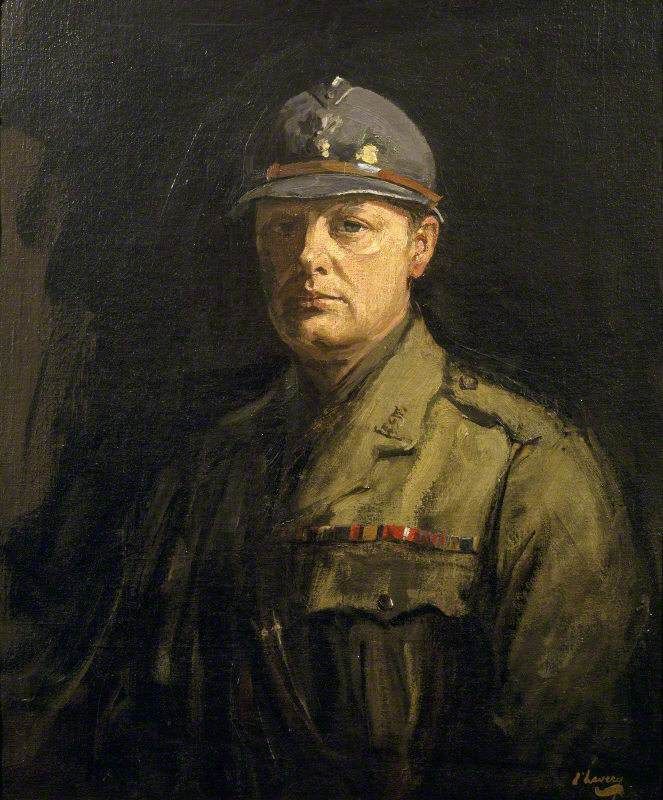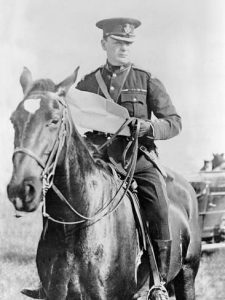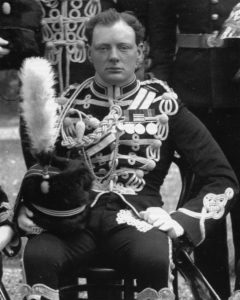
Finest Hour 181
The Military Churchill

Portrait of
December 30, 2018
Finest Hour 181, Summer 2018
Page 10
By Douglas S. Russell
Douglas S. Russell is author of Winston Churchill, Soldier: The Military Life of a Gentleman at War (2005).
Winston S. Churchill in his memoir My Early Life famously wrote, “Twenty to twenty-five, those are the years.”1 Indeed, those were years of great adventure and real achievement for the young lieutenant of the 4th Queen’s Own Hussars. During those years from 1895 to 1900, Churchill saw combat in Cuba, India, Sudan, and South Africa, was mentioned in dispatches and recommended for a decoration, earned four campaign medals and the Spanish Order of Military Merit, wrote five books, established himself as a popular war correspondent and lecturer, gained international fame as an escaped prisoner of war, and was elected to a seat in Parliament, all before his twenty-sixth birthday.
Churchill was interested in things military from a young age. His earliest surviving letter, written at age seven, is about toy soldiers, flags, and castles. It was, according to Churchill’s autobiography, his large collection of toy soldiers that led Lord Randolph Churchill to choose a military career for his son when Winston was only fourteen years old.2 As a schoolboy at Harrow, he was placed in the army class to prepare for the entrance examinations for the Royal Military College Sandhurst. He also actively participated in the Harrow School Volunteer Rifle Corps, where he wore a uniform and received military training for the first time. Churchill had an early and strong belief in his own star. As a schoolboy at Harrow he told a classmate in 1891, “I have a wonderful idea of where I shall be eventually…. London will be in danger and in the high position I shall occupy, it will fall to me to save the Capital and save the Empire.”3

2025 International Churchill Conference
Soldier of the Queen
He completed the eighteen-month course at Sandhurst in December 1894 ranked twentieth out of the 130 cadets in his intake. He received his commission from Queen Victoria as a second lieutenant with an effective date of 20 February 1895 at the age of twenty. He spent most of the next five years on active duty as a cavalry officer in the British Army.

His initial posting was with the Fourth Queen’s Own Hussars at Hounslow, a garrison west of London. During the long period of annual leave, Churchill sought military adventure, a scene of action where he could prove his courage to himself. He later wrote, “I thought it might be as well to have a private rehearsal, a secluded trial trip in order to make sure that the ordeal was not unsuited to my temperament.”4 He went to Cuba in November 1895— three years before the Spanish-American War—as an observer with the Spanish Army, which was trying to quell a rebellion of the colonized Cuban people. Churchill and his friend and fellow Fourth Hussar Lieutenant Reginald W. Barnes saw combat for the first time, coming under fire soon after Winston’s twenty-first birthday. Both young officers were up to the test and were decorated with the Spanish Order of Military Merit “for distinguished comportment under fire.”5
“In Injia’s Sunny Clime”
The Fourth Hussars were posted to India in the autumn of 1896 and were stationed in the southern city of Bangalore. There Churchill pursued a young man’s ideals: glory in sport and glory in battle. He excelled in sport as a member of the All-India polo championship team. Eager for active service, seeking the opportunity for distinction, and bored with the garrison life he found so uninteresting, Churchill obtained a position with the Malakand Field Force on the North-West frontier of India near the border with Afghanistan in September 1897.6
Churchill’s reason for going to the frontier was clearly set out in letters to his family: to establish a reputation for personal courage with a view toward seeking a future political career. He saw heavy action on numerous occasions in which the units to which he was attached suffered serious casualties. He handled himself bravely and capably in his two months on the mountainous frontier, earning his first British campaign medal (The India Medal 1895, clasp “Punjab Frontier 1897–98”). He was also recognized for his part in rescuing a wounded man under fire with a mention in Despatches, which stated in part, “Brigadier Jeffries has praised the courage and resolution of Lieutenant W. L. S. Churchill Fourth Hussars…who made himself useful at a critical moment.”7
Into Africa
Churchill’s next period of active service took him to Africa to participate in the British campaign to retake Sudan from the control of a Mahdist army of Sudanese Moslems, called the Dervishes, that had killed the British pro-consul General Charles Gordon and occupied the country in 1885. Churchill had lobbied hard to be included in the campaign, using all the considerable influence of his mother and her friends in the military and the government. It is notable that Churchill was always trying to get into battle and never to avoid it. General Sir Herbert Kitchener, commander of the combined British-Egyptian task force, was against Lt. Churchill coming out. He was of the opinion that Churchill was using the army as a convenience for his own purposes and that positions with the force should be given to career officers. It was also well known that the general did not like war correspondents, which Churchill had already been both in Cuba and in India.
In the event, Churchill’s efforts succeeded, and he received the following telegram from the war office: “You have been attached as a supernumerary Lieutenant to the 21st Lancers for the Soudan campaign…. It is understood that you will proceed at your own expense and that in the event of your being killed or wounded in the impending operations, or for any other reason, no charge of any kind will fall on British Army funds.”8
Arriving in Cairo on 2 August 1898, Churchill was with the 21st Lancers for their famous cavalry charge at Omdurman on 2 September. In a side action of the main battle, the regiment was riding south to cut off a Dervish line of retreat to Khartoum when it came under fire from what appeared to be 150 Dervish riflemen. The Lancers turned from column into line and charged toward the Dervishes across 250–300 yards of open ground. At the point of contact, the cavalrymen realized that behind the enemy fighters they had seen were 2,000 others concealed in a ravine. There followed a brief, vicious hand-to-hand fight as the Lancers rode through the enemy mass. They lost twenty-one killed and fifty wounded out of 440 men engaged, a casualty rate of fifteen percent. 119 horses were wounded. Churchill’s luck held, and he emerged unscathed. Three Victoria Crosses and seven Distinguished Conduct Medals were awarded for the action.

On the morning of the main battle and before the cavalry charge, Churchill had scouted in front of the British lines and saw the entire Dervish army: forty to fifty thousand men arrayed for battle in a line several men deep and four miles long. They proved no match for the mechanized firepower of the Anglo-Egyptian force of 16,000 troops. In that single morning of battle, the Dervishes lost an estimated 10,000 killed, as many wounded, and 5,000 captured. As Churchill rode over the main battlefield the next day, he was appalled by the human carnage. He wrote home, “These things made me anxious and worried during the night and I speculated on the shoddiness of war. You cannot guild it, the raw comes through.”9 Arguably, Churchill’s view of war began to change from the glory to the tragedy of war from this day.
Churchill received the Queen’s Sudan Medal and the Khedive’s Sudan Medal, clasp “Khartoum,” for his participation of less than eight weeks in the campaign. His subsequent two-volume history The River War chronicled the campaign and was—importantly—critical of Kitchener.10
The Boer War
I n spring 1899, Churchill resigned from the army and returned to England. As he had long planned, he stood for a seat in the House of Commons but lost the election. Nonetheless, the gods of war soon provided him with a new arena in his roles of war correspondent and serving soldier. Churchill’s last experience of war while still a young man came in the Second Boer War in South Africa in 1899–1900.11 Churchill went out as a correspondent and finally found the fame for which he longed.
A defining moment for Churchill came on 15 November 1899, two weeks after his arrival in South Africa. He took part in an armored train reconnaissance near Frere in Natal. The train was ambushed, and some of the cars derailed. Churchill took the lead in clearing the line, which allowed the engine and tender to escape with many wounded on board. The British force lost ten men killed, twenty-eight wounded, and twenty-three taken prisoner, a forty-seven percent casualty rate. Churchill was among those captured and spent his twenty-fifth birthday as a prisoner of war in Pretoria. In December he escaped and made his way to freedom via Portuguese East Africa. His capture and escape made him an international celebrity.
After his return to South Africa, Churchill obtained a commission in the South African Light Horse regiment and participated in the war for six months, earning the Queen’s South Africa Medal with six clasps. He was recommended for a decoration for his actions in the Battle of Diamond Hill on 12 June 1900. General Ian Hamilton wrote in his 1944 memoir Listening for the Drums, “During the South African War Winston gave the hosts at Diamond Hill an exhibition of conspicuous gallantry [the phrase often used in recommendations for the Victoria Cross] for which he has never received full credit.”12 Hamilton believed the recommendation was not forwarded to the War Office because General Lord Roberts and his chief of staff General Kitchener held negative views about correspondents in general and Winston Churchill in particular. General Lord Dundonald also recommended Churchill for “a reward” but nothing ever came of it.13 As Churchill later summed up his early army career to his personal private secretary Anthony Montague Browne, “I have many medals for adventure, but none for bravery.”14
Soldiering On
Churchill returned to England in July 1900, having finally made a name for himself in the public eye. In the khaki election of 1900, he was elected to the House of Commons and remained a member for most of the rest of his long life. Even as he pursued his political career, however, Churchill stayed close to military matters in government, as well as in his writing of history and continued service in uniform. In 1902 he became a reserve army officer in the Queen’s Own Oxfordshire Hussars, a Territorial Army cavalry regiment with which he served until 1924, and earned the Territorial Decoration along the way.
By the start of the Great War in 1914, Churchill was in the cabinet as First Lord of the Admiralty, the civilian head of the Royal Navy. Following the failure of the Dardanelles campaign in 1915, he resigned from the cabinet and believed his political career might be finished. Nonetheless, he found an honorable path was open to him, and as a forty-year-old major he sailed to France to join his regiment. Early in 1916 he was placed in command of the Sixth Battalion, Royal Scots Fusiliers by General Haig. With the temporary rank of Lieutenant Colonel, he led his men in the front lines of the Western Front for six months. He earned entitlement to three campaign medals: the 1914–1915 Star, the British War Medal, and the Victory Medal. This tour of duty proved to be Churchill’s last experience of active service and came more than twenty years after he was first commissioned.15
Walking with Destiny
Following his return to what he considered his true war station in London, Churchill resumed his political career and was back in the cabinet as Minister of Munitions by July 1917 in time to prepare for the final offensives of 1918. By 9 January 1919 he was serving as Secretary of State for War and Secretary of State for Air, giving him ministerial responsibility for both the army and the newly established Royal Air Force.
As a young man, Winston Churchill set out to become a hero, to make a name for himself as a courageous soldier in the public eye, and so to make possible a life of politics and statesmanship. It was, in fact, his achievements as a soldier and success as a war correspondent that confirmed his belief in his own star and helped him win a seat in Parliament. In the next thirty-nine years he served in every important cabinet office except foreign affairs and the premiership and was, at one time or another, the civilian head of all three main branches of the armed services, giving him a vast amount of administrative experience. As an MP for almost forty years, he had much experience with the business of politics, power, and coalition building. By virtue of both his active military service and civilian experience in military affairs, Churchill was well versed in both the tragedy and the opportunities of war. He was as well prepared for wartime leadership in 1940 as anyone could be. At last Prime Minister, Churchill assumed the role he predicted for himself as a Harrow schoolboy in the defense of Great Britain and its empire.
Endnotes
1. Winston S. Churchill, My Early Life, A Roving Commission (London: Thornton Butterworth, 1930), p. 74
2. Ibid. pp. 33–34.
3. Martin Gilbert, In Search of Churchill (London: Harper Collins, 1994), p. 215.
4. My Early Life, p. 90.
5. Archivo General Militar, Sergovia, Spain, Seccion I, Legajo E–1344.
6. Churchill’s account of this campaign is The Story of the Malakand Field Force: An Episode of Frontier War (London: Longmans, Green, and Co., 1898).
7. The London Gazette, 11 January 1898, p. 151.
8. My Early Life, p. 182.
9. Randolph S. Churchill, ed., Winston S. Churchill, Companion Volume I, Part 2, 1896–1900 (Boston: Houghton Mifflin, 1967), p. 974.
10. Winston S. Churchill, The River War: An Historical Account of the Reconquest of the Soudan (Longmans, Green, and Co., 1899).
11. Churchill published two books based on his newspaper dispatches from South Africa: London to Ladysmith via Pretoria (London: Longmans, Green, and Co., 1900) and Ian Hamilton’s March (London: Longmans, Green, and Co., 1900).
12. General Sir Ian Hamilton, Listening for t
he Drums (London: Faber and Faber, 1944), p. 248.
13. Lt-Gen. The Earl of Dundonald, My Arm
y Life (London: Edward Arnold, 1926), p. 147.
14. Anthony Montague Browne, Long Sunset: Memoirs of Winston Churchill’s Last Private Secretary (London: Cassell, 1995), p. 171.
15. Although he wrote no separate book about his service in the Great War, certain aspects of it are set out in his collection Thoughts and Adventures (London: Thornton Butterworth, 1932).
Subscribe
WANT MORE?
Get the Churchill Bulletin delivered to your inbox once a month.



